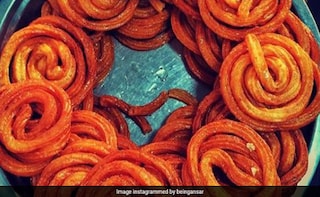If there is anything that can compete with the phenomenon of samosa in this country, it has to be the crisp and sweet jalebi. It was somewhere in the 13th century that the west Asian import made inroads into the culinary map of India, as Zolabiya, and here we are eight centuries later, absolutely hooked to our dear jalebi. Crispy, coiled and ever-so delightful jalebi, is staple across all halwais and sweetmeat shops in the country and is our all-time favourite too. Did you know that the recipe of jalebi is said to be first recorded in the 16th century, 'Bhojana Kutuhala,' - one of the subcontinents first books of recipes and food science written by Raghunath. The recipe that was mentioned in the book is still practiced to prepare jalebi now. The phenomenon of jalebi is so great that people have designed several rich and coarse variants of it, as well. One of our most favourite is paneer jalebi.
Kallan Sweets, Shop No. 4 & 5, Matia Mahal Road, Opposite Jama Masjid Gate No. 1, Matia Mahal, New Delhi, Delhi 110006.
Old Famous Jalebi Wala, 1795, Dariba Kalan Road, Dariba Corner, Opposite to Central Baptist Church, Chandni chowk, New Delhi, Delhi 110006.Got any more places to suggest? Mention them in the comments section below.
Advertisement
Kallan Sweets, Shop No. 4 & 5, Matia Mahal Road, Opposite Jama Masjid Gate No. 1, Matia Mahal, New Delhi, Delhi 110006.
Old Famous Jalebi Wala, 1795, Dariba Kalan Road, Dariba Corner, Opposite to Central Baptist Church, Chandni chowk, New Delhi, Delhi 110006.Got any more places to suggest? Mention them in the comments section below.
For the latest food news, health tips and recipes, like us on Facebook or follow us on Twitter and YouTube.
Advertisement
